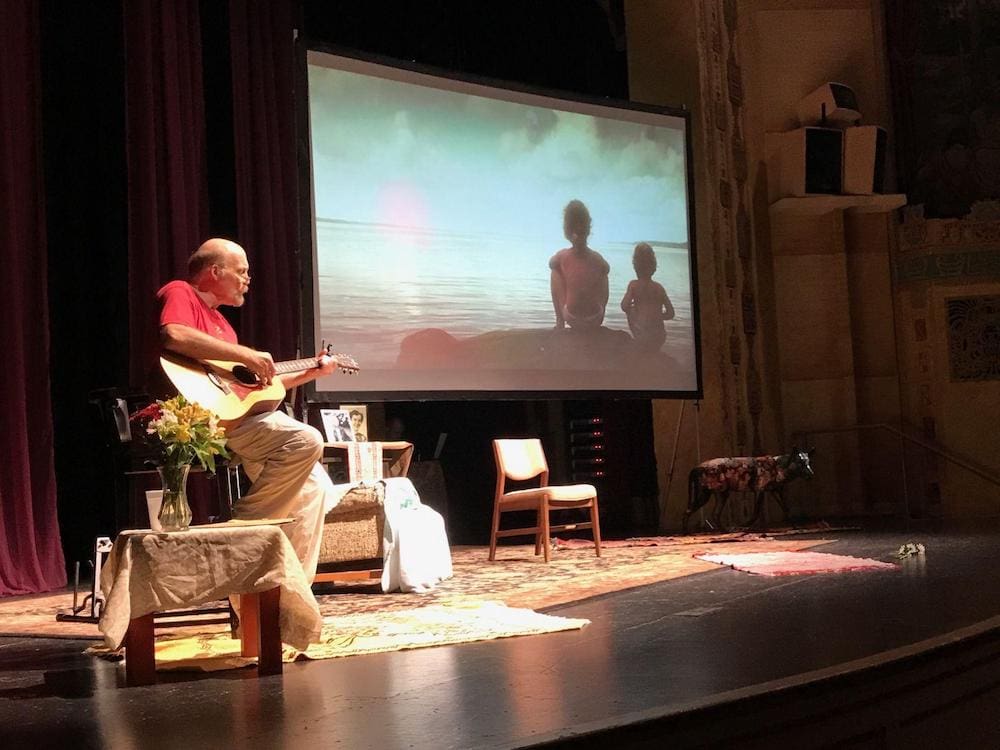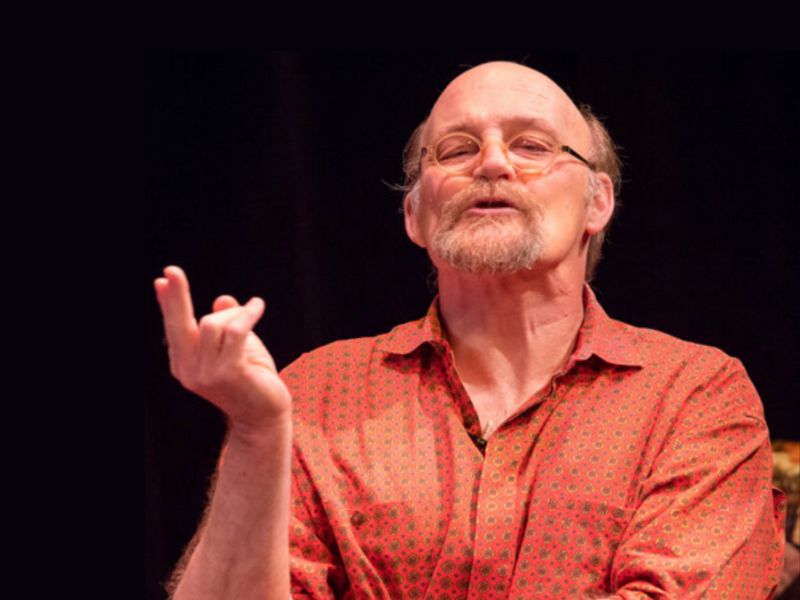“When there’s no instrument to cover it, you can hear the heart in the voice.”
— Eugene Wolf in The Book of Mamaw
The Book of Mamaw is a one-person show that is 90 minutes of sincere, unabashed, and unrestrained comfort and joy. It is worth the price of admission, worth the time spent, and worth the trust you invest in the evening’s presenter and playwright, Eugene Wolf. He wastes none of it.
If you were raised in a religious tradition, you are probably familiar with the concept of a “Book” that is named after someone and that contains the collected stories, teachings, and learnings of the person after whom the book is named. The Book of Mamaw is just such an item. It is the collected stories, teachings, and learnings of Mamaw, the name that Wolf, as a child, called his maternal grandmother. The play is Wolf’s tribute to this woman, who raised him and gave him the tools he needed to be able to encounter and engage with life and the holes it can make in people’s hearts. It is also about Wolf’s journey of learning “how music fills up the holes.”

The performance is filled with music — TV commercials, country music, pop music, spirituals, Carter family gospel, protestant hymns, Joni Mitchell anthems, and classic Barbra Streisand — most of it sung by Wolf in a disarming and unassuming tenor voice. His is not the kind of voice you would find on American Idol. In fact, American Idol (and maybe idolatry of any form) would seem to be the opposite of everything this show seeks to encourage in its audience. Instead, The Book of Mamaw invites us to enter into a kind of musical communion that acknowledges with gentleness and reverence the sacred gift of being human.
In part, this is a story of poor people in the United States and how, when we are poor, we can go about creating our lives: what our survival can look like: what we have to have in order to survive. It is partly — but only partly — because of his family’s poverty that Eugene is raised primarily by his grandmother. This is also a story about what people need in order to more than survive. It’s about what people need in order to live up to and embrace the promise of their humanity. Mamaw was the person who, from the beginning of Eugene’s life, saw and celebrated his being in the world exactly the way he was: a boy who responded to singing and performing. And Mamaw’s house was filled with music: “church” music. Eugene informs us: “Mamaw was always humming those songs when I was a kid. They were a link between me and Mamaw’s young life, which I knew nothing about.” It was “church” music for a reason. “Mamaw approached her God with a sharp single-minded focus as she embraced the doctrine of the Church of Christ as her steadfast path.” It was a path, as it turns out, Eugene Wolf could not take. Though it is never given words and labeled (or “branded”), we get an idea of some of the impediment to his following Mamaw’s path as we hear the young Eugene’s obsession with Connie Francis and Barbra Streisand and see him respond to Mamaw’s career suggestions. “You’re gonna get a dress and wear it.” (This directive comes after Mamaw sees Boy George on tv.) “He’s got two earrings. You’ve only got one. You need to get you two earrings.” (This comes after seeing George Michael and Wham! on TV.) Wolf follows these suggestions happily.
The functional set has a place for the guitar to rest, a place for the actor to sit, and a place for the TV to be. Projections through a television allow us to see title pages of chapters from The Book of Mamaw turn. In this “Book” we see pictures of Mamaw and Eugene and the rest of the family. We also see the animated TV commercials that so excited the pre-adolescent Eugene and alerted his grandmother to his passion and potential talent.

As both performer and playwright of The Book of Mamaw, Eugene Wolf succeeds at both in such a way that the presentation felt like a gift. The story was substantive yet easy to follow. The acting was unfussy and unpretentious, and he was unafraid to be both obvious and authentic. Wolf has not learned these hymns in a workshop or seminar. He has lived these hymns.
In one elegant scene, by intoning the Muslim call to prayer, then declaiming the solfeggio of the shape note music of his youth as well as the lines of hymns his Mamaw sang around the house, Wolf embodies for us the bridging of gaps and the filling of holes across humanities and cultures that music can make happen. It’s a scene that has to be experienced. After we experience this he points out:
Embedded in the intention of … those songs was the love, the compassion and the kindness that my Mamaw had lived. She had imparted that to me through her living and I knew it was that music that would carry me on.
It does the same for the audience of this show.
Running Time: 90 minutes, with no intermission.
The Book of Mawmaw — part of the Logan Festival of Solo Performance presented by 1st Stage — plays through October 17, 2021, outdoors in Boro Park at The Boro Tysons, 8350 Broad St, Tysons, VA (Silver Hill Drive and Broad Street). Tickets ($20, general admission; $15, military; $10, student) can be purchased online or by calling the 1st Stage box office at 703-854-1856.
CREDITS
The Book of Mamaw written and performed by Eugene Wolf
Director – Susanne Boulle
Artistic Director – Alex Levy
Stage Manager – Heather Ogden
Lighting Designer – Kay Darnell
Sound Designer – Phil Leonard
Associate Artistic Director – Deidra Lawan Starnes
Video Book – Brian Tibbs
Technical Crew – Joseph Brown Miller, Ash Jeffers
SEE ALSO:
1st Stage announces live theater lineup, outdoors and in (season announcement)




